Brewing Change: Bungalow Evolves From a Hobby to a Neighborhood’s Heart
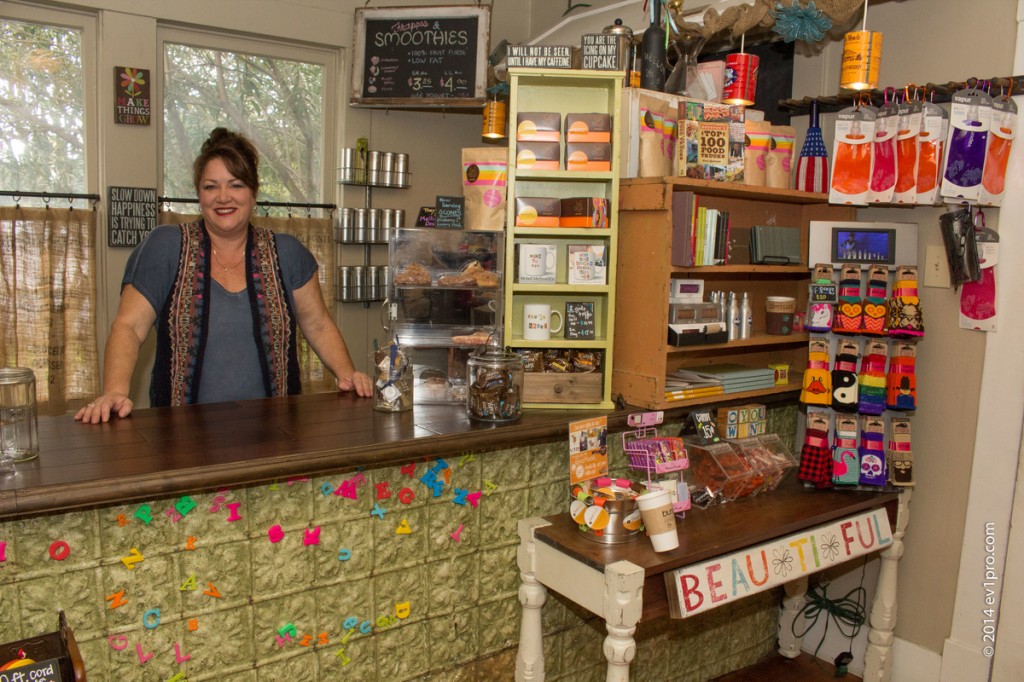
Fourteen years ago, palms calloused, scalp full of grease, Denise Skorka made a Scarlett O’Hara vow. She and husband David had been running The Auto Doc, a well-regarded Montrose car repair and maintenance business, and while she didn’t mind helping out, Denise decided she was not going to spend the rest of her life under a car. “Someday,” she promised herself, “someday, I’m going to do something girly.”
Denise Skorka’s vow was uttered more than a decade ago. But in 2008 it came true with Bungalow, which fulfills her dream with an almost alarming quantity of estrogen. Tucked inside a hundred-year-old house located right next to The Auto Doc, the coffee/gift/clothing shop is a shrine to dainty, crafty femininity. Vintage settees and chairs are poised for conversation just so. Bins overflow with fluffy slippers and throws. Embroidered frocks sway on a clothes rack. From the walls, plaques offer gentle homilies about caffeine, niceness, and how one is required for the other.
And near the door there’s a counter where you can order the beverage that, in theory at least, is Bungalow’s primary reason for being.
In truth, though, the shop was an afterthought. When the Skorkas bought the land on which the bungalow that became Bungalow stood, they just wanted more space to fix cars. Then Denise noticed that The Auto Doc clients often hung around for the more minor repairs. Why not, she thought, sell them coffee and tchotchkes for extra revenue?
That she could indulge in frilly decorating made the project pleasing. At the time, that was as far as Denise’s vision went. But as the Skorkas and their neighborhood have matured, Bungalow has come to be something more: not just a garage waiting room, but a reminder of what has made Montrose so special to so many.
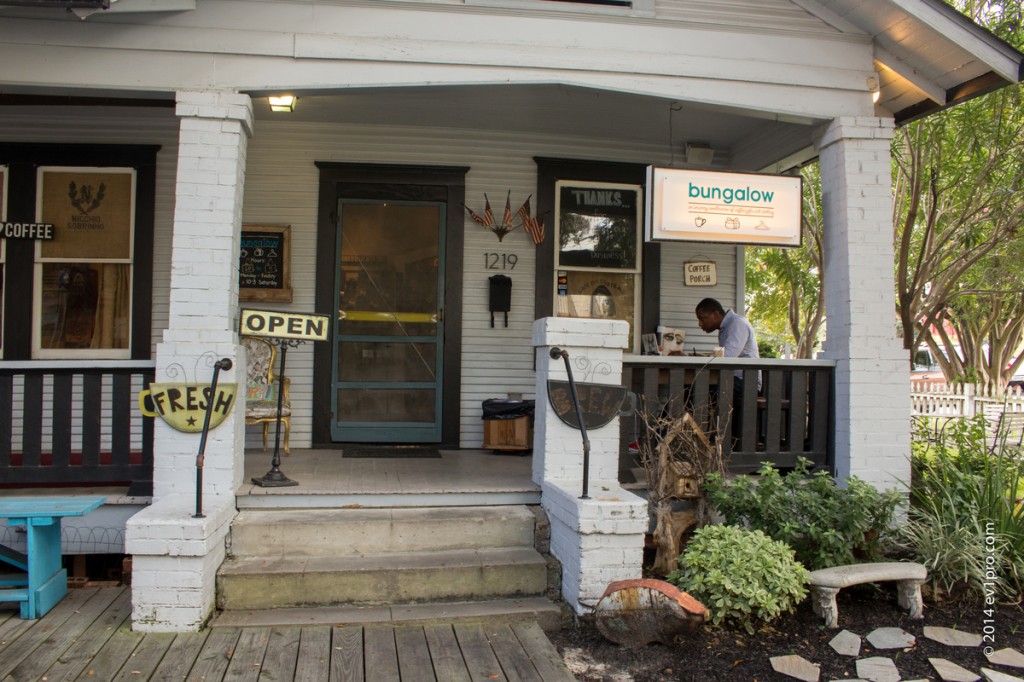
Denise and David Skorka settled in Houston in 1989. They had fallen in love in their home city of St. Paul, Minnesota, where David had returned for a Christmas visit. But, he told Denise, if she agreed to marry him, she would have to relocate to Houston, where he’d been working as a mechanic.
He’d grown addicted to the climate.
“I’m not going to fix another car in a Minnesota winter,” David told his betrothed. “In Houston you can work outside all year round.”
Denise, a lively, easy-going woman who managed medical practices by day and sang for an otherwise all-male rock band at night, was game. While they eventually bought a house in Jersey Village, near their daughters’ private school, the couple never thought of running the family business anywhere other than Montrose.
“We’ve always liked it here,” Denise says. “When we first came, it was vagrants and transients – it was a lot darker. But we love music, and go to see music all the time. We have a heart for this neighborhood.”
For a decade David worked as a mechanic for Chevron. Those were the days when gas stations offered full service. Then, having built a roster of clients who liked his straightforward style and no-pressure advice, he and Denise started their own repair shop on Taft Street. They remained there until, according to Denise, their landlord broke a gentleman’s agreement to sell them the property. It was a sign of the changing times, and real estate values. As Denise recalls, “He told us: ‘Someone else offered me three times the price, and I’m renting it to them instead.’ ”
Scrambling, the Skorkas managed to buy their current property at the corner of Montrose and West Clay. The purchase was made possible through the help of some new friends. Raised Lutheran, but non-observant as adults, the Skorkas became Baptists in Houston. As Denise tells it, one of her daughters asked one day why she was the only child in her class who didn’t go to Sunday school. And with that question, “I instantly became convicted.”
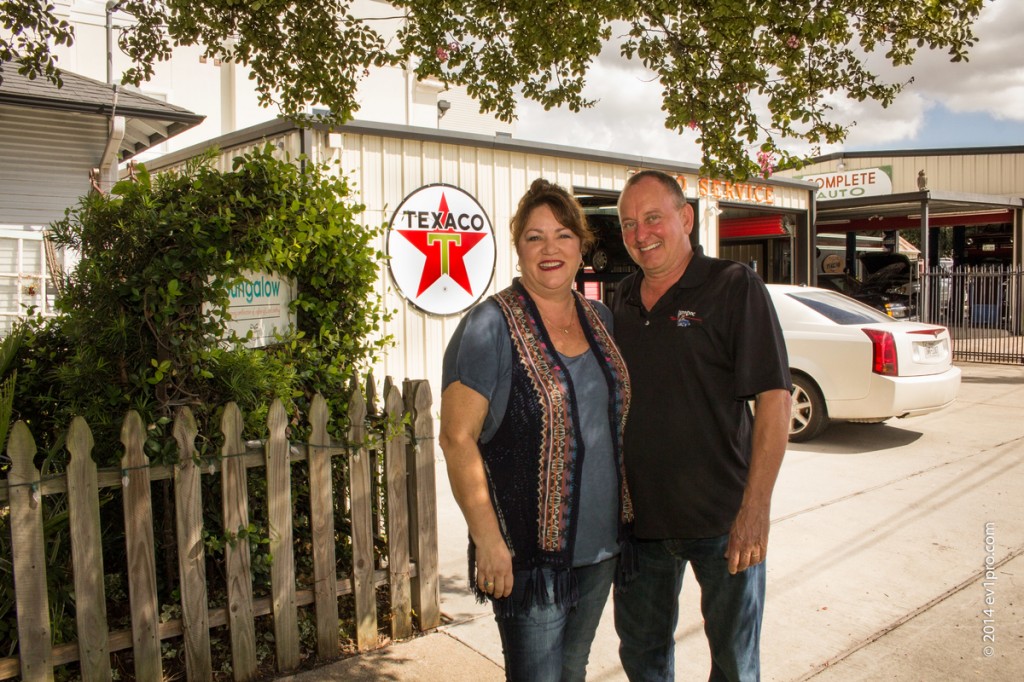
In some ways she was as surprised as anyone who knew her. She and David joined a Baptist church, and their faith became a visible, active part of their identities. So intertwined was their faith with their work that they were able to buy The Auto Doc property because a church member loaned them money, allowing their equipment to count as collateral.
Yet religion never interfered with the Skorkas bond to Montrose, the gay flagship of Houston.
“Much of Dave’s clientele is from the gay community,” Denise says. ”We are supposed to be a light in the world. It’s not my place to criticize. It’s my job to love and to draw people to the love of Christ.” On reflection, she adds, “And we’re not from a super-conservative church.”
Once Bungalow opened, Denise made an additional set of friends in the artists and neighbors who lived and worked in the surrounding area. Jane Weiner, director of the late, beloved dance center Hope Stone Studio, “used Bungalow as her office,” Denise says. “She came almost every day. I miss her.”
It soon became clear that Denise was as essential to Bungalow’s appeal as the big porch, the signature sugar syrups she makes for the coffee, and the museum of frilliness she has made of the interior. Neighborhood clients grew to love Denise. And they grew to love Bungalow.
“Five out of ten people come here because of social media,” Denise says. “I know, because I watch it. And I have a lot of people who come to do work here. I have a lot of people bring food, have an hour-long meeting here. I know a lot of people come because of me, and I like that. I like talking. We really feel like people do business with people.”
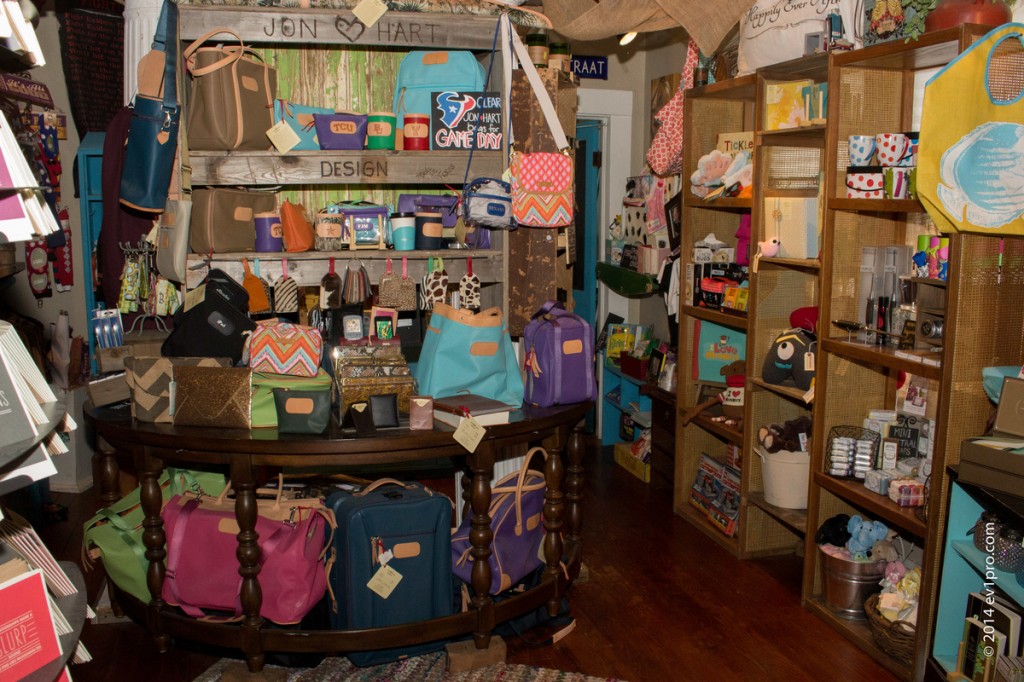
On a brilliant Saturday in October, Bungalow is leaping with life. While Denise has intentionally made the interior too snug to camp out in for the day, the front porch and yard are designed for just that. A worn picnic table is surrounded by a lawn full of inviting chairs, and in ones and twos, customers open the picket gate, wander in with their dogs, and sip coffee as canines ranging from a Pekingese to a pit bull sniff each other.
Denise, in an embroidered black vest and knee-length black shorts, pushes open the screen door and sits down to enjoy her customers. At 55, she is no longer the rock-and-roll girl who used to change tires while wearing skorts, though she retains a rebellious assurance. Even as a young woman, she was a good businessperson. But today, watching her customers savor the open space of an old-fashioned lawn, she looks a little melancholy.
She loves Bungalow, and would never shut it down abruptly, she says. But as a creative individual she has evolved – she wants to move on from decorating. Lately she’s been working on a plan to make the back room into a studio where she can refinish furniture.
And the coffee trade isn’t exactly big business. There’s not enough parking, which means most of her customers who don’t come from The Auto Doc are pedestrians. Devoted as those might be to the place, they’re not enough to turn a profit. Meanwhile, The Auto Doc desperately needs extra room; it’s about 90 percent saturated, and if it is to grow it needs more property – such as that on which Bungalow sits.
On the other hand, if Bungalow remains as it is, it could certainly have a new clientele. “There’s an eight story development going up across the street there,” Denise says, pointing to a nearby lot.”That’s a lot of coffee customers …” she trails off. The development replaces a favored restaurant, and the construction could mean a couple of years of backed up trucks and limited parking.
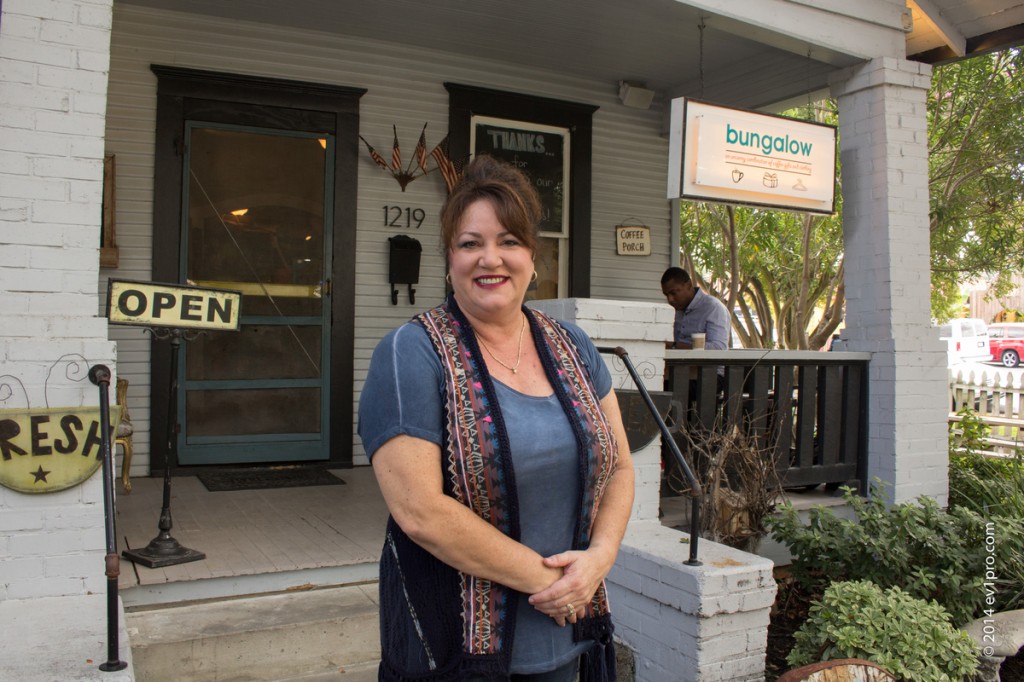
Running Bungalow is a bit of a headache, truth be told. And what could turn a profit, a possibly huge one, is to do what countless other Montrose bungalow owners have done: Sell. Today, the property would certainly go for many times the Skorkas’ cost. It could even be enough to fund another of Denise’s dreams – a bed and breakfast back home in Minnesota, after the couple retires.
Yet Denise knows the coffee and the place she provides is not just for her anymore. It’s for her customers as well, many of whom seem as attached to the property as she is. As Denise notes, these days there’s a particular significance to selling one of Montrose’s remaining bungalows. As a reminder of an older Montrose, Bungalow has a value beyond the bottom line.
“This place turned a hundred years old this year,” Denise says. “And the reason there is so much space in front is because it’s old, and so small inside.” And unlike some other property owners, she has few pressures on her to make money from her investment. “I sleep next to the landlord,” she says. “I don’t pay anything.”
And that landlord, she says, can’t imagine her shutting Bungalow down: it’s too much an extension of her personality and her talents. So as far as she and her husband can envision right now, Bungalow will stand, and she will find a way to evolve creatively alongside it.
“This community is changing so much, and we’ve got to change with it,” Denise says. “But I can’t imagine not being here.”

My car became overheated after a hit and run driver hit me down the street and I knew I had to get some where quick, abs like a sign from God there was auto doc Fans went out of his way to help me, I live in Katy and him not even knowing me have me one of his lender car to get home but not before taking me back to Denise bungalow where she served me up! free coffee and soothed my nerves with her beautiful things and being in Montrose and her shop brought me to a place of my hippie youth and when I hung out at the antique row on westhiemer ands taft I came back the next day Dave arranged my rent car ands took care of not ony my car needs but the body shop needs with a man around the corner, these are the real deal ppl, when I got in his loaner car I put the radio on ksbj 89.7 abs Dave immediately told me they were Christians and I knew that God’s hand was all on thisthanks again Dave and Denise